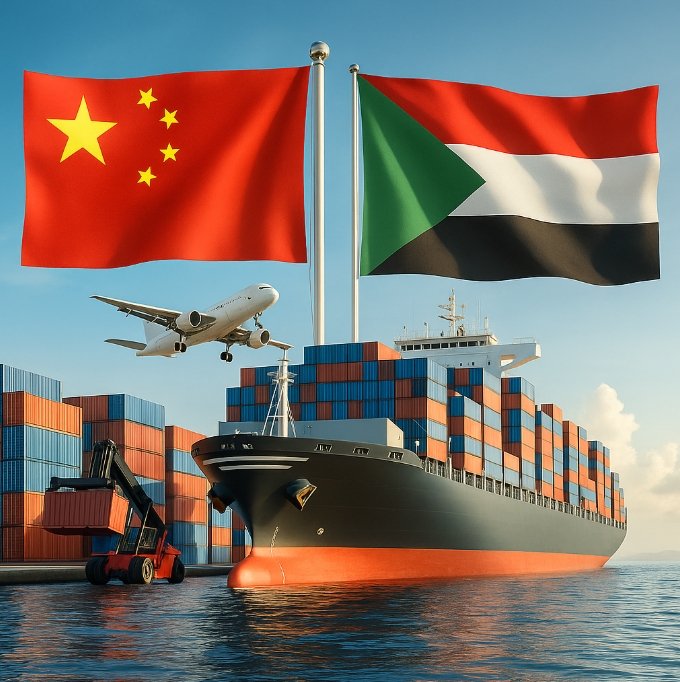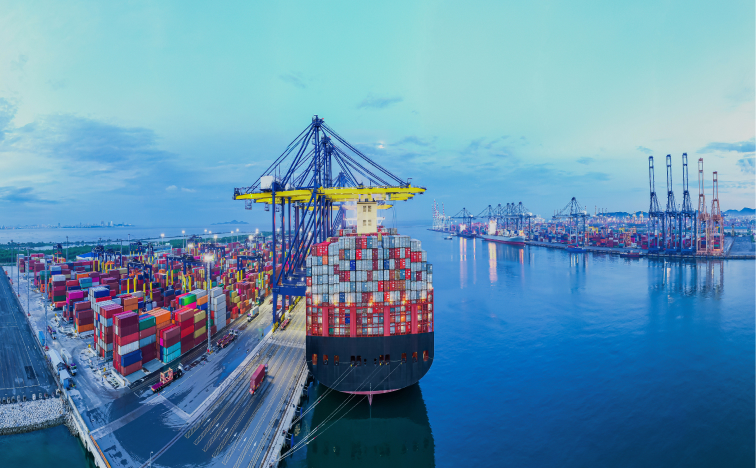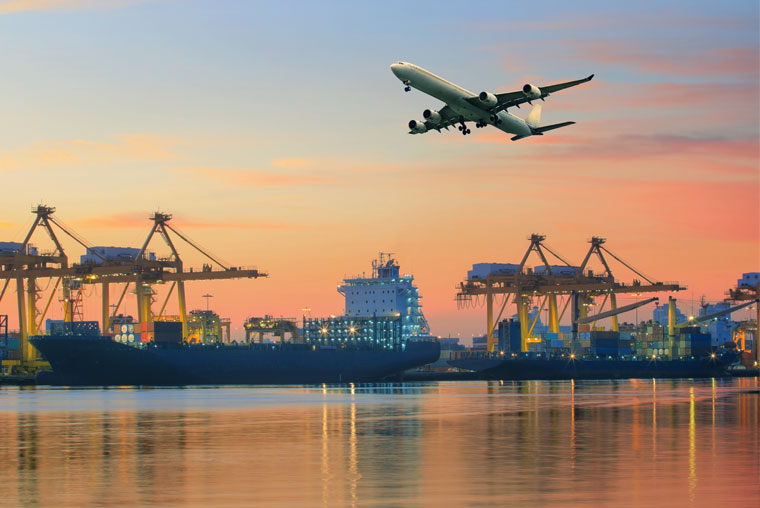- By TOP CHINA FREIGHT
- August 27, 2025
- Shipping
Shipping from China to Sudan has become increasingly important as Sudan’s import demand rises for electronics, machinery, textiles, construction materials, and consumer goods. Efficient logistics planning is essential to balance costs, transit times, customs compliance, and risk management. This guide explores transportation options, costs, customs procedures, port selection, and actionable strategies for successful shipments.

1.Transportation Options
Choosing the right transportation method depends on cargo type, urgency, and budget.
| Method | Transit Time | Best For | Pros | Cons |
|---|---|---|---|---|
| Sea Freight (FCL/LCL) | 20–40 days | Bulk cargo, industrial goods | Cost-effective, high capacity | Slower transit, port congestion |
| Air Freight | 4–8 days | Urgent, high-value, perishable goods | Fast, reliable, minimal handling | High cost, limited capacity |
| Road Freight | 15–25 days | Medium-volume shipments, regional delivery | Door-to-door, flexible | Limited coverage, potential border delays |
| Multimodal (Sea + Road) | 25–35 days | Balanced cost and speed | Efficient inland delivery | Requires transloading |
Pro Tip:
- Combining sea and road transport is often the most cost-efficient way to reach inland Sudanese cities like Khartoum and Port Sudan.
2.Sea Freight

Sea freight is the most economical solution for shipping from China to Sudan, especially for full container loads (FCL) and less-than-container loads (LCL).
Transit Times
- Shanghai / Ningbo → Port Sudan: 30–40 days
- Shenzhen / Guangzhou → Port Sudan: 28–35 days
Estimated Costs
| Container Type | Approximate Cost |
|---|---|
| 20ft FCL | $2,200 – $2,800 |
| 40ft FCL | $3,800 – $4,500 |
| LCL (per CBM) | $70 – $100 |
Advantages
- Cost-effective for bulk shipments
- Flexible FCL and LCL options
- Large capacity for industrial goods
Disadvantages
- Longer transit times than air freight
- Potential port congestion during peak season
Pro Tip:
- Consolidating LCL shipments can reduce costs and simplify customs clearance.
3.Air Freight

Air freight is ideal for urgent or high-value shipments.
- Transit Time: 4–8 days
- Best For: Electronics, fashion, pharmaceuticals, perishable items
- Major Airports in Sudan: Khartoum International Airport (KRT)
- Cost: $6–$10 per kg depending on weight and route
Pro Tip:
- Air freight is suitable for small volumes that need quick replenishment, reducing the risk of stockouts.
4.Road and Multimodal Transport

Road freight, often combined with sea freight, is increasingly used for inland deliveries.
- Transit Time: 15–25 days depending on entry points and customs clearance
- Best For: Medium-volume shipments, industrial machinery, consumer goods
- Advantages: Direct delivery to inland destinations, flexible routing
- Disadvantages: Limited network coverage and potential border delays
Pro Tip:
- Partnering with experienced forwarders ensures smooth transshipment from Port Sudan to inland destinations like Khartoum or Nyala.
5.Ports and Key Routes
Understanding ports is vital for cost-effective shipping.
China Ports
- Shanghai & Ningbo: Eastern industrial hubs
- Shenzhen & Guangzhou: Southern production centers
- Qingdao & Tianjin: Northern manufacturing areas
Sudan Ports
- Port Sudan: Main seaport on the Red Sea, critical for imports
- Khartoum Inland: Requires road transport from Port Sudan
Pro Tip:
- Choosing a port near your supplier in China can reduce inland transportation costs.
6.Customs Clearance in Sudan
Efficient customs clearance is crucial to avoid delays or penalties.
| Document | Purpose |
|---|---|
| Commercial Invoice | Declares the value and description of goods |
| Packing List | Lists quantity, weight, and dimensions |
| Bill of Lading / Air Waybill | Proof of shipment |
| Import License | Required for restricted items |
| Certificate of Origin | Facilitates preferential treatment under trade agreements |
| Insurance Certificate | Protects high-value or fragile cargo |
Tips for Faster Clearance:
- Submit digital copies in advance
- Ensure accurate HS codes
- Pre-calculate duties and taxes to avoid surprises
7.Duties, Taxes, and Fees
Customs duties depend on HS code and product category.
| Product Type | Estimated Duty |
|---|---|
| Electronics | 5–15% |
| Textiles & Apparel | 10–20% |
| Industrial Machinery | 0–10% |
| Chemicals / Raw Materials | 5–15% |
Pro Tip:
Work with a licensed customs broker for accurate duty calculation and compliance with Sudanese regulations.
8.Cost-Saving Strategies
- Consolidate shipments to reduce LCL charges
- Book early to secure competitive rates during peak season
- Optimize port selection to reduce inland transport
- Use multimodal transport for inland delivery efficiency
- Leverage forwarders’ networks for better rates and smoother logistics
9.Industry-Specific Recommendations
| Industry | Recommended Mode | Notes |
|---|---|---|
| Electronics | Air Freight | Fast delivery, minimal risk |
| Machinery & Equipment | Sea Freight (FCL) | Handles heavy cargo efficiently |
| Textiles & Apparel | LCL / Air Freight | Seasonal demand requires speed |
| E-commerce | Express / Courier | Small parcels, fast delivery |
| Raw Materials | Sea Freight | Cost-effective for bulk shipments |
10.Seasonal Considerations
1.Peak Season:
August–December sees increased shipments due to regional demand
2.Chinese New Year:
Factory shutdowns may delay production
3.Trade Surges:
Book shipments in advance to secure space and rates
Conclusion
Efficient shipping from China to Sudan relies on proper planning, choosing the the right transport method , and ensuring customs compliance. Leveraging experienced freight forwarders, multimodal shipping, and strategic port selection can reduce costs, minimize delays, and guarantee safe delivery to Sudan.
Need a Shipping Quote?
If you want expert guidance and peace of mind, our team is ready to assist.
TJ China Freight offers tailored solutions to help businesses of all sizes ship more reliably from China.
FAQs
Q1:Which shipping method is the most economical?
Sea freight FCL is cheapest for bulk shipments. LCL works for smaller cargo volumes. Air freight is fastest but costlier.
Q2:Can shipments reach inland cities like Khartoum?
Yes, multimodal shipping combining sea and road allows direct delivery to major inland destinations.
Q3:Are there restrictions on imports to Sudan?
Certain chemicals, electronics, and pharmaceutical products require import permits. Always check with a licensed customs broker.
Q4:Is cargo insurance necessary?
Highly recommended, especially for high-value, fragile, or perishable items, to mitigate potential loss or damage.
Q5:How are customs duties calculated?
Based on HS codes, declared value, and product category. Accurate documentation and using a broker ensures compliance.
